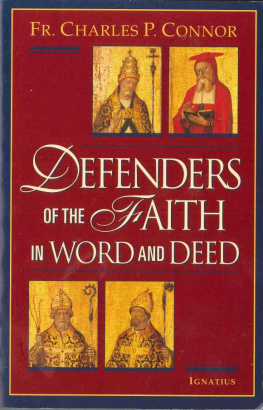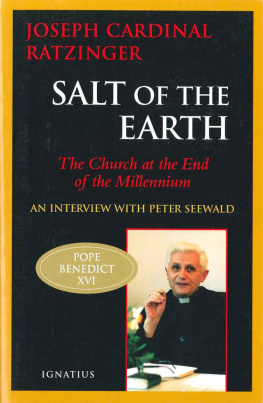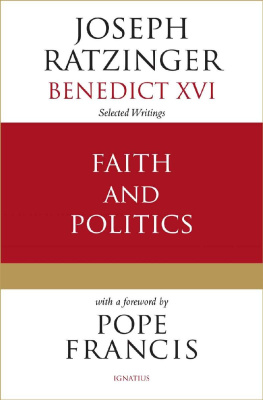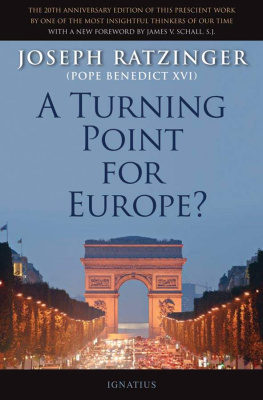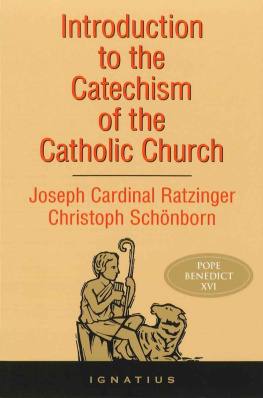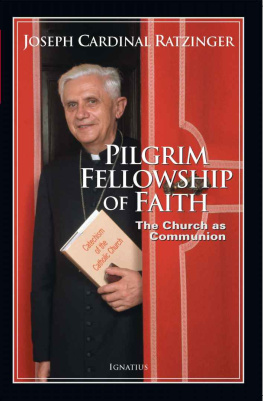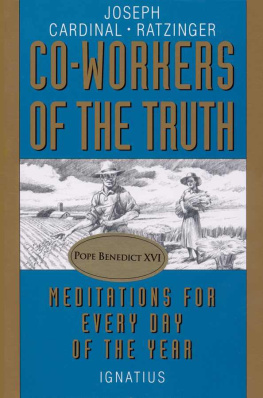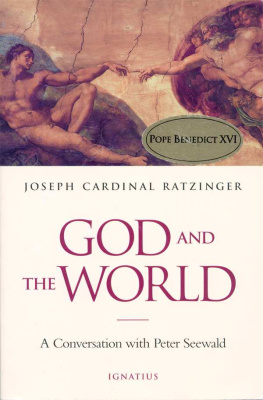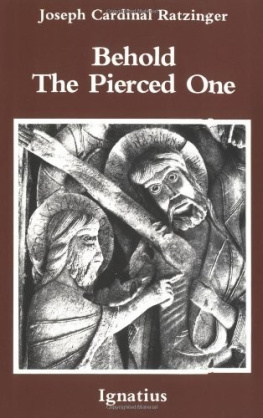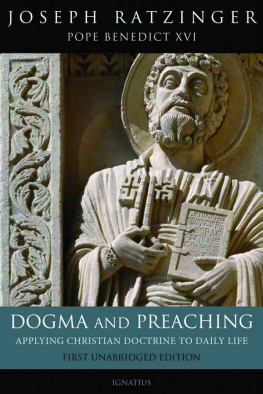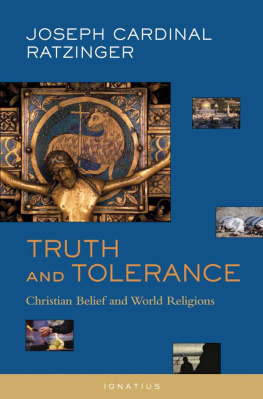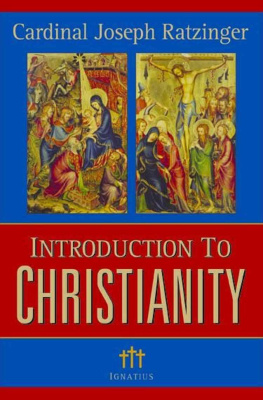DEFENDERS OF THE FAITH
IN WORD AND DEED
FR. CHARLES P. CONNOR
DEFENDERS OF
THE FAITH
IN
WORD AND DEED
IGNATIUS PRESS SAN FRANCISCO
Cover art: Carlo di Giovanni Braccesco
The Church Doctors: Gregory, Ambrose, Augustine, Jerome
Camera photo / Art Resource, New York
Cover design by Riz Boncan Marsella
2003 Ignatius Press, San Francisco
All rights reserved
ISBN 978-0-89870-968-1
Library of Congress Control Number 2003105178
Printed in the United States of America
TO OUR HOLY FATHER, POPE JOHN PAUL II
IN THE TWENTY-FIFTH YEAR
OF HIS PONTIFICATE
His defense of the faith in our times has been unparalleled
CONTENTS
FOREWORD
When my good friend Father Charles Connor asked me to review and introduce his new book, which draws inspiration and encouragement from great figures in Catholic Church history, I was more than pleased to do so. Father Connor is an authentic teacher of history, one who makes the past come alive by writing well and at the same time drawing lessons for us from what happened in the past. His very successful series on EWTN has gone directly against our times, the prevailing view that superficially dismisses history as unimportant. Since I grew up during a previous era that some have seen as a golden age of America, from the end of World War II to the victory of civil rights, I was educated with a knowledge of and enthusiasm for history. In those days any thinking high school or college student knew the truth of the saying that those who did not study history were bound to repeat it, especially its mistakes.
It is actually amazing how quickly a working knowledge of history disappeared among young Americans and how an awareness of the fascinating history of the Catholic Church vanished from Catholic education. When I recall incidents from history to the members of my community, I am amused that our young friars think I am extraordinarily learned, but all I am actually doing is recounting what any moderately well-educated Catholic of the mid-twentieth century had been taught.
Father Connor is one of the few intrepid souls working to reverse our chronic religious, civic, and clinical amnesia. And he is all the more interesting since he is clearly not one of those historians who simply pile on the facts. Instead he teaches in order to present the broad sweep of events and their relationship to one another. Following the model of Saint Augustines City of God , Father Connor, like the great Bishop, relates the significant events to the history of salvation. In history thus conceived, people do not simply perform deeds, but they react to Gods unfolding Providence. Father Connor uses the very reliable method of describing people and not simply events or things. He paints portraits of important and inspiring people at significant moments in Church history, beginning with a selection of martyrs and ending with some of the most interesting people of our times like Cardinal Mindszenty, Father Walter Ciszek, and Cardinal Ratzinger.
This book will be helpful for serious students of any age, that is, people who are determined to learn for their own growth and development as human beings and Christians. While Father Connor is not presenting original research, he makes use of several primary sources and standard works that can lead the reader to more detailed accounts. Most of the great Christians we meet in this book are the subjects of serious biographies and scholarly analyses. What Father Connor does is bring to life names that may be already familiar, like Augustine and Aquinas, and some that may be less well known, like Athanasius, John Fisher, and my own dear friends Frank Sheed and Maisie Ward.
This book comes at a crucial and painful moment in Catholic Church history. The present eraone of creativity but also of dissent, of apparent development as well as confusion, of great activity but of many losing their wayis coming to end. Like most other eras, I think it will be seen as a field sown with wheat and weeds. At the beginning of the third millennium we witness an era of weakened and eroded Catholic identity. It is a time of incredible cultural mediocrity, in which many young people, despite a good deal of life experience, suffer from a seriously deficient education. This is particularly regrettable because the young obviously try and want to learn, but often they are given contrived experiences and a sadly inadequate education. A recently compiled high school text of several hundred pages about the history of the United States mentioned neither Washington nor Lincoln, because we dont need heroes. This attitude is similar to Catholic religious education that scarcely mentions the sacraments or, God forbid, the divinity of Christ.
Defenders of the Faithin Word and Deed is something refreshingly different. This work is part of a sea change beginning to take place now in Catholic education: history with heroes, history with passion, conviction, and heart. Here we find examples of valiant disciples of Christ who, in spite of their very bad times, remained faithful and dynamic in their response to that mysterious and unique entity that Christ established to bring his life, teaching, and sacraments to the world until the end of time.
Father Benedict J. Groeschel, C.F.R.
I
Early Christian Martyrs of
the Roman Empire
In the year A.D. 111, Pliny the Younger wrote to the Emperor Trajan, informing him how the persecution of the Christians was going:
The method I have observed toward those who have been denounced to me as Christians is this: I interrogated them whether they were Christians; if they confessed it I repeated the question twice again, adding the threat of capital punishment; if they still persevered, I ordered them to be executed.... The temples, which had been almost deserted, began now to be frequented... and there is a general demand for sacrificial animals, which for some time past have met with few purchasers.
To which Trajan replied:
The method you have pursued, my dear Pliny, in sifting the cases of those denounced to you as Christians is eminently proper ... no search should be made for these people ; when they are denounced and found guilty they must be punished; but where the accused party denies that he is a Christian, and gives proof... by adoring our gods, he shall be pardoned.... Information without the accusers name subscribed must not be admitted in evidence against anyone.
Our Lords Apostles brought the gospel message to a Roman Empire that, in geographical terms, did not substantially differ from the one in which Constantine proclaimed Christianity the official religion in the fourth century. Octavian Augustus is usually considered the first Roman Emperor, one who ushered in two centuries of relative tranquility. Most descriptive sources fix the boundaries of the Empire at Armenia and Mesopotamia, the Arabian Desert, the Red Sea, Nubia, the Sahara, the Moroccan mountain ranges, the Atlantic Ocean, the Irish Sea, Scotland, the North Sea, the Rhine, the Danube, the Black Sea and the Caucasus. In addition, Augustus is also credited with adding territory along the North Sea west of the Elbe and areas in the vicinity of the Danube.
In this vast political setting, religion was very much a personal affair. Families, and even individuals, could have their own deities, although it was not at all uncommon to find entire cities worshipping one god. The state tolerated this, provided the religious cult or personal belief was not hostile to the government or so exclusive as to appear suspect.
Judaism was a separate case. It had a certain exclusivity about it, in that no Jew could belong to another cult nor be allowed to participate in any type of emperor worship. One would think Jews would be severely punished, if not persecuted. Instead, Judaism was officially protected in the Empire. The reason was curious: Jews were a part of a nation subject to Rome. Their religion and nationality were synonymous, and Judaism was not a sect likely to attract non-Jewish adherents. Furthermore, their numbers were not expected to increase dramatically, hence their lot was not an unhappy one as far as being tolerated by the Empire went.
Next page
